Sufficient levels of Lutein, Zeaxanthin, and Meso-Zeaxanthin in our eye are vital for optimal visual performance, visual comfort, and even sleep quality [Enhancing Performance While Avoiding Damage: A Contribution of Macular Pigment (2013), Macular Carotenoid Supplementation Improves Visual Performance, Sleep Quality, and Adverse Physical Symptoms in Those with Hight Screen Time Exposure (2017)]. Moreover, lower MPOD at the very center of macular pigment was found in eyes with Age-related Macular Degeneration (AMD) when compared to healthy eyes [Comparison of macular pigment optical density in patients with dry and wet age-related macular degeneration (2017)], suggesting macular pigment’s critical role in protecting our central vision from photochemical damage.
Lutein, Zeaxanthin, and Meso-Zeaxanthin collectively form macular pigment, our natural blue light filter and anti-oxidant. Since a typical diet rarely offsets the depletion of our macular pigment it makes a lot of sense to consider eye supplements containing all three macular pigment carotenoids: Lutein, Zeaxanthin and particularly Meso-Zeaxanthin, which dominates at the center of macular pigment.

Disclaimer: My interest in macular pigment and blue light is due to my problems with light sensitivity (photophobia), discomfort glare, and computer eye strain. I am not a vision scientist.
Disclosure: I would like you to know that if you use some of the links below and purchase a product I earn a small commission at no additional cost to you. To support GLARminY, use commission links. You may also “give” a small percentage of anything you might buy from Amazon by accessing Amazon here (commission link) at any other time. Thanks.
Computer screen excessive blue light emissions are often the root cause of computer eye strain
Excessive blue light is a terrible disturbance to our precision vision and has become increasingly problematic with the advent of computer screen-based lifestyles. Digital screens require precision vision, yet unlike natural light sources, they tend to emit blue light with disproportionally high intensity.
Spectral power distribution (SPD) of digital screens exhibits important differences when compared to natural light sources: SPD of a typical digital screen has an extremely high peak in the blue wavelength range. It doubles the green peak and triples the red peak in intensity. Natural sources, to which our eyes are adapted, have a more evenly distributed SPD (Sun) or emit blue light with lower power compared to longer wavelengths (fire/candle, moon). Note absolute intensities (vertical axis) are very different. Click to enlarge. Source: fluxometer.
Excessive blue light from digital screens makes our eyes strain because:
- our macula (the spot of sharpest vision in our retinas) has no photoreceptors for blue light, and
- blue light reaches the macula out of focus (due to chromatic aberration).
You can see why digital screens with their high blue light content tend to be the worse possible setting for good visual performance, visual comfort, and possibly even eye health.
Subsequently, the risk of developing chronic eye fatigue and computer eye strain symptoms is increased unless blue light is effectively blocked with macular pigment (Lutein, Zeaxanthin and Meso-Zeaxanthin) or some other, external blue light filter [Contrast Sensitivity and Lateral Inhibition Are Enhanced With Macular Carotenoid Supplementation (2017), Blue-Light Filtering Spectacle Lenses: Optical and Clinical Performances (2017)].
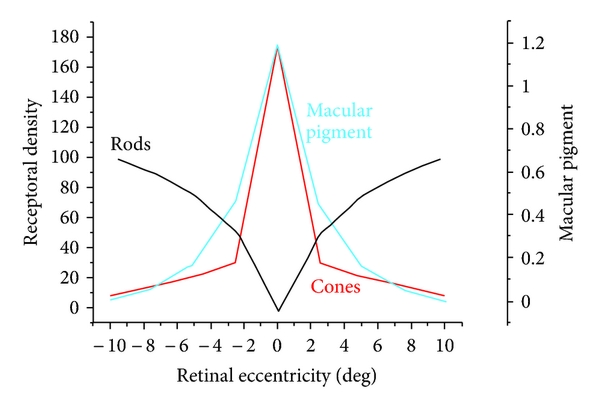
The image shows Macular pigment’s (MP) placement at the center of our retinas, right in front of the spot of the highest Cone density. Cones are photoreceptors for photopic – daylight, precision vision. (Rods are our photoreceptors for low light conditions that, conversely, depend principally on blue light). Source: [The Visual Effects of Intraocular Colored Filters (2012)]
Where does Meso-zeaxanthin come from: directly from food or from Lutein?
Recently there has been a lot of progress in macular pigment research enabled by technological advances. Subsequently, older theories are being questioned – certainly the hypothesis that Meso-Zeaxanthin is bio-converted wholly and solely from Lutein in our macular pigment. Moreover, challenges inherent in the separation and quantification of Meso-Zeaxanthin have resulted in scarcity of data on the content of this carotenoid in different foods, and have rendered the study of tissue concentrations of this compound problematic [What is meso-zeaxanthin, and where does it come from? (2013)].
In the midst of this scientific debate, what is really important right now is that supplements containing Lutein, Zeaxanthin, and Meso-Zeaxanthin improve our macular pigment performance and that they are safe.
Do Lutein, Zeaxanthin and Meso-Zeaxanthin supplements work?
It is been demonstrated that supplementing Lutein, Zeaxanthin and Meso-Zeaxanthin does help maintain or rebuild macular pigment to be more effective at filtering blue light [A Double-Blind, Placebo-Controlled Study on the Effects of Lutein and Zeaxanthin on Photostress Recovery, Glare Disability, and Chromatic Contrast (2014). Serum and retinal responses to three different doses of macular carotenoids over 12 weeks of supplementation (2016)].
Are macular pigment supplements safe?
There is no evidence that eye supplements containing Lutein, Zeaxanthin and/or Meso-Zeaxanthin have any negative side effects [Supplementation with all three macular carotenoids: response, stability, and safety (2011)]. This is reasonable considering that all these three substances are normally found in our food, blood, and eyes (see also Meso-zeaxanthin, Web-md, Leaf).
Should you consider macular pigment eye supplements?
Macular pigment is being constantly consumed in the anti-oxidative process protecting our central vision photoreceptors. Thus its efficiency (at filtering blue light and its anti-oxidative capacity) is gradually reduced.
Our diets tend not to be sufficiently reach in Lutein, Zeaxanthin and Meso-Zeaxanthin to offset macular pigment depletion.
 Examples of different macular pigment profiles [Macular pigment imaging in AREDS-2 participants: an ancillary study of AREDS-2 subjects enrolled at the Moran Eye Center (2013)]
Examples of different macular pigment profiles [Macular pigment imaging in AREDS-2 participants: an ancillary study of AREDS-2 subjects enrolled at the Moran Eye Center (2013)]
It therefore makes sense to use supplements containing Lutein, Zeaxanthin and Meso-Zeaxanthin. Particularly if:
- you are a heavy computer user
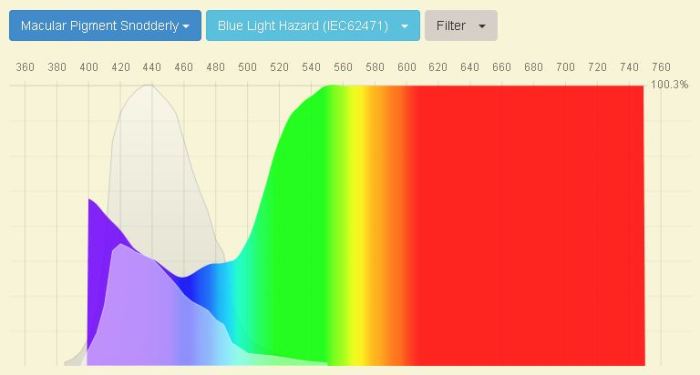 Spectral transmission of macular pigment: It filters most light at ~460nm, which coincides with peak intensity of blue light emitted by digital screens. Image source: Fluxometer.
Spectral transmission of macular pigment: It filters most light at ~460nm, which coincides with peak intensity of blue light emitted by digital screens. Image source: Fluxometer.
- you already feel the symptoms of computer eye strain and you’ve noticed that eliminating computer blue light helps
- your macular pigment is low or its spatial profile shows irregularities, particularly a dip at its center (see image above)
- you’ve been diagnosed with low macular pigment optical density (MPOD)
- you want to prevent computer screen-related eye fatigue
- you have Age-related Macular Degeneration (AMD), or are concerned about developing one; It’s been hypothesized that as anti-oxidants -and due to their optical properties- Lutein, Zeaxanthin and particularly Meso-Zeaxanthin also protect against AMD [Macular pigment and its contribution to visual performance and experience (2013)]
- you have some other vision condition associated with blue light
Best macular pigment supplementation formula: With Meso-zeaxanthin
It’s been shown that the Lutein, Zeaxanthin and Meso-zeaxanthin work best together (as blue light filter and anti-oxidant). Meso-zeaxanthin dominates at the epicenter of our macular pigment and is essential for effective protection of our central vision from blue light. (Zeaxanthin dominates in the mid-periphery, and Lutein in the periphery) [Distribution of lutein and zeaxanthin stereoisomers in the human retina (1997)].
Moreover, Meso-zeaxanthin is the most potent anti-oxidant [Synergistic effects of zeaxanthin and its binding protein in the prevention of lipid membrane oxidation (2005)].
Given that Meso-Zeaxanthin is about a third of our macular pigment and because of the above mentioned scientific dispute about how Meso-Zeaxanthin is replenished in our eye, it is reasonable to take macular pigment supplements containing all three carotenoids, including Meso-zeaxanthin.
However, just before listing 11 such eye supplements, it should be recognized, that there are many other popular macular pigment eye supplements that don’t declare containing Meso-zeaxanthin (amounts of Lutein and Zeaxanthin per serving are specified where available):
PreserVision:
– AREDS 2 formula (Lutein 10mg, Zeaxanthin 2mg)
– AREDS 2 formula + Multivitamin (Lutein 5mg, Zeaxanthin 1mg)
– AREDS Lutein formula (Lutein 5mg)
PreserVision brand store at Amazon (commission link).
EyePromise:
– Restore (Lutein 4mg, Zeaxanthin 8mg);
– DVS (Luten 4mg, Zeaxanthin 8mg)
– AREDS 2 Plus Zinc-Free (Lutein 10mg, Zeaxanthin 10mg)
– AREDS 2 Plus with a Multi-Vitamin (Lutein 10mg, Zeaxanthin 10mg)
– Vizual Edge (Lutein 7mg, Zeaxanthin 14mg)
– Vizual Edge Chewable (Lutein 10mg, Zeaxanthin 20mg)
– Vizual Edge PRO (Lutein 8mg, Zeaxanthin 26mg)
– Zeaxanthin (Zeaxanthin 10mg)
– Zeaxanthin + Lutein (Lutein 10mg, Zeaxanthin 10mg)
EyePromise brand shop on Amazon (commission link).
Ocuvite:
– Eye Health Gummies (Lutein 5mg, Zeaxanthin 1mg)
– Adult 50+ (Lutein 5mg, Zeaxanthin 1mg)
– Eye + Multi (Lutein 10mg, Zeaxanthin 2mg)
– Lutein 25 (Lutein 25mg, Zeaxanthin 5mg)
Ocuvite – Amazon shop (commission link).
See also Amazon Best Sellers in:
– Carotenoids Nutritional Supplements (commission link)
– Lutein Nutritional Supplements (commission link)
Lutein, Zeaxanthin and Meso-zeaxanthin eye health supplements
Below is the list of eye health supplements containing all three carotenoids. It is divided in two sections:
– Eye supplements that focus exclusively on macular pigment carotenoids (as active ingredients, contain only Lutein, Zeaxanthin, and Meso-Zeaxanthin)
– Eye supplements containing other minerals, vitamins, omega-3 rich oils, etc. in addition to macular pigment carotenoids
(The amounts of Lutein, Zeaxanthin and Meso-Zeaxanthin are as declared per serving).
Pure macular pigment eye supplements
MacuHealth and MacuShield (identical amounts of the three macular pigment carotenoids per serving) put a lot of emphasis on Meso-Zeaxanthin, which appears reasonable given its position at the center of macular pigment and its high anti-oxidative power.
MacuHealth
(Lutein 10mg, Zeaxanthin 2mg, Meso-Zeaxanthin 10mg)
See below for a cheaper version of what appears to be the same product.
Buy MacuHealth from Amazon (commission link)
MacuShield
(Lutein 10mg, Zeaxanthin 2mg, Meso-Zeaxanthin 10mg)
– the UK equivalent to MacuHealth – but cheaper!?
Based on the similarities it seems safe to consider Macushield equivalent to MacuHealth (above):
- note the visual similarities between the two brands
- the same slogan
- importantly, in terms of active ingredients they are identical: 10mg Lutein, 2mg Zeaxanthin and 10mg Meso-Zeaxanthin.
I’ve been using MacuShield for a year, with good results (see full review).
MacuShield is available also to US customers through Amazon.UK (commission link). The savings may be worth waiting a few extra days for your eye supplements to arrive.
MacuShield Vegetarian
(Lutein 10mg, Zeaxanthin 2mg, Meso-Zeaxanthin 10mg)
Buy MacuShield Vegetarian on Amazon.UK (commission link).
Doctor’s Best Lutein with Meso-Zeaxanthin Supplement
(Lutein 20mg, Zeaxanthin 4mg including minimum 1mg of Meso Zeaxanthin)
Buy Doctor’s BEST Lutein on Amazon (commission link)
Puritan’s Pride Healthy Eyes Lutigold Extra
(20mg of Lutein, Zeaxanthin, and Meso Zeaxanthin combined)
Shop Puritan’s Pride Healthy Eyes Lutigold Extra at Amazon (commission link)
Eye supplements containg other active ingredients in addition to Lutein, Zeaxanthin and Meso-Zeaxanthin
EXIR Saffron Vision Max 20/20
(Lutein 10mg, Zeaxanthin 2mg, Meso-Zeaxanthin 10mg)
Buy EXIR Saffron Vision Max 20/20 on Amazon (commission link)
MacuShield GOLD – the AREDS-2 Formula
(Lutein 10mg, Zeaxanthin 2mg, Meso-Zeaxanthin 10mg)
Shop Macushield Gold on Amazon.UK (commission link)
MacuShield EnergEyes with B-complex vitamins
(Lutein 10mg, Zeaxanthin 2mg, Meso-Zeaxanthin 10mg)
Shop MacuShield at Amazon.UK (commission link)
EXIR Saffron Vision Max AREDS-2 Formula
(Lutein 10mg, Zeaxanthin 1mg, Meso-Zeaxanthin 10mg)
Buy EXIR Saffron Vision Max AREDS-2 Formula at Amazon (commission link)
Life Extension MacuGuard Ocular Support plus Astaxanthin
(Lutein 10mg, Meso-Zeaxanthin and Trans-Zeaxanthin 4mg)
Shop MacuGuard at Amazon (commission link)
OS2 – The Ocular Support Solution
(Lutein 10mg, Zeaxanthin – including Meso-Zeaxanthin 2mg)
Shop OS2 – The Ocular Support Solution on Amazon (commission link)
Jarrow Formulas Macula Protective Factors
(Lutein 20mg, Zeaxanthin 3mg, Meso-Zeaxanthin 10mg)
Shop Jarrow Formulas Macula Protective Factors on Amazon (commission link)
Ps: If you found the post: 11 Best Lutein, Zeaxanthin, and Meso-Zeaxanthin eye supplements useful, please consider LIKING, REBLOGGING, and/or SHARING it below.
















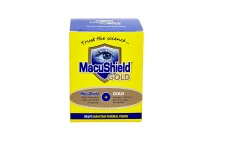




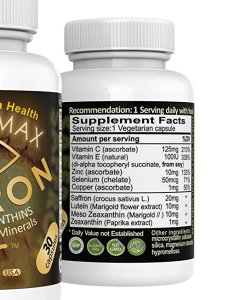




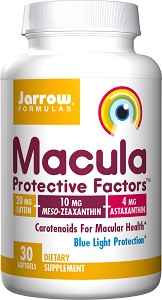

Uros, the price difference in the Puritans Pride seems tremendous. I called their Customer support line to get the exact supplement measurements and they stated the Meso-Z and Z are both 4mg ea.
For .20Cents/pill that’s a no-brainer, right? Evern if I doubled up on the pills for 8mg of each (or .40cents/pill), still at half the Amazon price of .89/pill for Macuhealth. (@10/10/2)
I am assuming the source of these supplements are apples to apples and no quality difference?
LikeLike
Hi,
I’m trying to order the MacuShield as I’ve been using the MacuHealth for a year now and can’t afford it anymore. However, based on the link you posted, the UK Amazon site doesn’t ship to US, Los Angeles, CA. Can you tell where else I go?
LikeLike
Carolyn, hi and thanks for writing.
I live in the EU, so for me it’s simple 🙂
Here is what you can do:
Order it and have it shipped to a firend in the UK.
Than ask your friend to forward it to you.
You’ll pay a bit extra for shipping, but it might make sense given the const difference between macushield and macuhealth.
If you don’t know anyone in the UK, maybe I can help you out
(but it will be slower and probably also more expensive, because I don’t live in the UK).
LikeLike
Hi Selkie, tried the link and got a 404 Page not Found message. Can you check it please?
LikeLike
that link is a year old… just tried.. 404… for me too… I still have a few months left then I’ll try elsewhere… good luck
LikeLike
Hey man,
Thanks for all of your work! I have a few questions regarding blue light. To my understanding, a lot of studies have been showing how bad blue light is at night because it disrupts the circadian rhythm, but not a lot of studying has been done on blue light during normal office hours.
I’ve heard a lot of people say that the natural light from the sun is way more intense than the 6500K of light from a typical LCD monitor so we shouldn’t worry?
Even if monitor blue light is a problem, then isn’t it better to attack the root cause by either use blue light blocking glasses, or use a software filter like f.lux instead of taking supplements?
Thanks.
LikeLike
PotatoLover, hi and thanks for your comment (… love’em too – potatoes 🙂
Yes, you are right. Blue light from the Sun is stronger than blue light from digital screens.
Like several hundred times stronger! (source).
That difference in isolation is in favor of the argument that blue light from screens cannot hurt your eyes.
BUT:
There are other important differences between the two light sources:
– you’d never stare into the Sun – high intensity blue light would burn your light-sensitive cells
VS. you stare at at your screen – this lower dosage might hurt those cells over time? – there’s no conclusive evidence, though.
– digital screens emit lots of blue light (degenerative effect on cells) BUT NO near-IR light (aids regeneration)
VS. the Sun – more than 40% of total energy is in the near-IR range (about the same as the total energy of visible light, blue light is a fraction of that)
Basically there are three things to worry wrt blue light from screens:
1. eye strain,
2. potential sharp vision light-sensitive cell death (there is no conclusive evidence), and
3. hormonal imbalance, that can lead to insomnia and indirectly increase the hazard of many diseases (cancer, heart diseases, depression ,…).
Now, here the deal:
a/ If your macular pigment is strong & healthy you don’t need to worry about 1. and 2. (ever)
b/ If you don’t use digital devices and energy saving lamps (fluorescent & LED) after sunset you’ve taken care of 3.
(macular pigment protects only your macula from blue light.
But not the rest of the retina which detects day/night info from blue light intensity in the environment) – an amazing design, really! 🙂
The problem is: Both a/ and b/ are not always easy.
Bottom line:
– taking macular pigment eye supplements you hope to take care of eye strain and AMD (1. and 2.) in the long run
– in the short run you help your eyes with an external blue light filter (app, glasses, screen protector). With any of these you’ll still get enough blue light during the day – (blue light during the day is necessary for hormonal balance).
– if you can’t avoid blue light sources in the evenings and at night, you need an external filter (should block all blue light at least up to 500nm, better up to 530nm) – AND IT’S BEST IF ITS WRAPAROUND GLASSES
I hope that helps? (sorry about the length) Let me know if you have more questions. 🙂
LikeLike
Thank you for all of this information! I recently came across a supplement on the internet called “Vision Alive” for AMD. Have you heard of it and/or have a review?
LikeLike
Evelyn, hi and thanks for your comment.
I suppose you are referring to this Vision Alive?
with these ingredients:
Moreover, the website mentions zeaxanthin and anthocyanin in addition to Lutein.
Looks like it doesn’t include meso-zeaxanthin!
As commented in the article above, research recommends supplements with meso-zeaxanthin to improve macular pigment. Particularly for AMD prevention.
Does that help?
LikeLike
Yes, that is the one! Thank you. I have placed an order of MacuShield with high hopes. Just learned there is some degradation of the macula in my left eye. I will give an update when I have one.
LikeLike
I am glad to have access to your site
https://www.amazon.com/Jarrow-Formulas-Protective-Zeaxanthin-Astaxanthin/dp/B077QK6722
I think this formula could also be in your list!
LikeLike
Gwonpyo Lee, you are right – the list needs fixing. Thanks for bringing it up! Similar formulas should increasingly be offered in the market 🙂
LikeLike
BritishPharmacare.com sent me, with free shipping, 90-capsules MacuShield to Washington, DC, USA for $32.99 USD. Fishpond site says (23/6/2018) MacuShield isn’t available.
LikeLike
Dorita, thanks for this info! Many from the US should appreciate it 🙂
LikeLike
I don’t know what strength Lutin, zeaxantin,meso zeaxantin would be best for my eyes, and which one do you recommend taking
LikeLike
Sue, thanks for your comment.
Unfortunately, research in this area is not at a stage where it could be predicted with high degree of certainty which formulation could be best for you, or me :(.
I might add that recent research suggests that oil filled products are more stable over time than powder filled products [Stability of Commercially Available Macular Carotenoid Supplements in Oil and Powder Formulations (2017)] – in case this helps you decide.
LikeLike
Thanks guys for the research 👍I see Amazon UK are selling it for £27 about48 Aus
LikeLike
Do you have a link for that? I just tried – but the four at around £27- £28 that I checked – don’t ship to Aus… a few of the higher priced do – but have additional £5.67 (x 2) postage.
LikeLike
HI, What a great site! I have had macular degeneration for about 10 years and have just found out about lutein zeaxanthin & meso-z after watching a tv program last night (Australia) and after spending hrs searching online getting nowhere I stumbled across your site, Thank You it explained everything I needed to know,
the problem I have is meso-zeax is not available in Australian health companies (don’t know why?) or Australia, so can I Get away with just buying Lutein & Zeaxanthin rather than buying overseas
thankyou
Alan D
LikeLike
Alan, hi and thanks for your comment.
If I were you, I’d rather get supplements with meso-zeaxanthin.
As suggested above, science still doesn’t have a definitive answer to the question of where does meso-zeaxanthin come from. So, it depends which of the two existing hypothesis you are ready to believe:
1. Meso-zeaxanthin is obtained directly from food
2. Meso-zeaxanthin is bio-coverted from Lutein within the eye (the older hypothesis)
On the one hand, if you get supplements with all three carotenoids, you’ll be getting meso-zeaxanthin no matter which of the two hypothesis is correct.
On the other hand, there is research showing that supplements that do not claim Meso-zeaxanthin in their formulas, in reality contain it; see Table 1 in [Stability of Commercially Available Macular Carotenoid Supplements in Oil and Powder Formulations (2017)].
So, you could try supplements that don’t claim Meso-zeaxanthin, hoping that there is a good amount of it in it, or hoping that your eye will bio-convert it from Lutein.
(Note that the proponents of the newer hypothesis–Meso-zeaxanthin is obtained from diet– use this argument to say that hypothesis 2 is incorrect. Specifically, they suggest that Meso-zeaxanthin has always been in our diets, just like Lutein and Zeaxanthin. However, until recently we haven’t had the technology to detect it. They also suggest that this is the problem of the research proposing hypothesis 2–bio-covernsion of Meso-zeaxantin from Lutein in the eye–namely, the supplements used in those experiments were thought to contain only Lutein and/or Zeaxanthin, but in fact contained also Meso-zeaxanthin.
I hope this helps?
LikeLike
Hi Alan and Uroš,
I just ordered 2 x 3 months supply (ie: 6 months) of MacuShield from:
https://www.fishpond.com.au/0949224859394
at $73.85 (x 2) and free shipping (to Australia from UK)
Kind Regards 🙂
Selkie
LikeLike
Selkie, great news for the readers from Australia! Thanks! 🙂
LikeLike
You’re so welcome 🙂 and thanks to you for such a well researched, comprehensive website!
LikeLike